|
|
|
Sort Order |
|
|
|
Items / Page
|
|
|
|
|
|
|
| Srl | Item |
| 1 |
ID:
192005
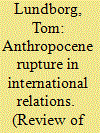

|
|
|
|
|
| Summary/Abstract |
The Anthropocene rupture refers to the beginning of our current geological epoch in which humans constitute a collective geological force that alters the trajectory of the Earth system. An increased engagement with this notion of a rupture has prompted a lively debate on the inherent anthropocentrism of International Relations (IR), and whether it is possible to transform it into something new that embraces diverse forms of existence, human as well as non-human. This article challenges that possibility. It shows how much of the current debate rests on the idea fulfilling future desirable ideals, which are pushed perpetually beyond a horizon of human thought, making them unreachable. As an alternative, the article turns to Jacques Derrida's understanding of the future to come (l'avenir), highlighting the significance of unpredictability and unexpected events. This understanding of the future shows how life within and of the international rests on encounters with the future as something radically other. On this basis, it is argued that responding to our current predicament should proceed not by seeking to fulfil future ideals but by encountering the future as incalculable and other, whose arrival represents an opportunity as much as a threat to established forms of international life.
|
|
|
|
|
|
|
|
|
|
|
|
|
|
|
|
| 2 |
ID:
161633
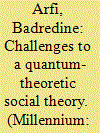

|
|
|
|
|
| Summary/Abstract |
A key claim that Alexander Wendt makes in his book Quantum Mind and Social Science: Unifying Physical and Social Ontology is that he is not using the ‘quantum’ as a metaphor. Nor is he drawing analogies either. He argues that he is constructing a quantum theory of the human subject and social structures through a quantum-theoretic explanation of consciousness undergirded by a panpsychist hypothesis of primitive proto-consciousness. In this article I show how Wendt’s insistence that he is developing a literally-speaking quantum-theoretic approach presents him with a number of must-not-ignore challenges that originate in quantum theory. I specifically discuss three challenges:
|
|
|
|
|
|
|
|
|
|
|
|
|
|
|
|
| 3 |
ID:
102777
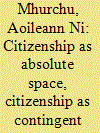

|
|
|
| 4 |
ID:
183700
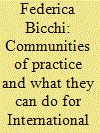

|
|
|
|
|
| Summary/Abstract |
This article argues that communities of practice (CoPs) provide IR with a unique way to understand how a small group of committed people can make a difference to international politics. The point is addressed in three steps. First, the article advances our understanding of how CoPs work. While at its core a CoP is a group of people brought together by a practice they enjoy, a CoP also shares a sense of timing, placing, and humour. These aspects help the group anchor, refine, and innovate their practice in the face of challenges and uncertainty. Second, the article contrasts the analysis of CoPs with other IR approaches, especially institutional analysis, network analysis, and epistemic communities, to show how CoPs supplement them. Third, the article illustrates the argument with the example of the EU foreign policy towards the Israeli-Palestinian conflict. It concludes by suggesting that a CoP's perspective not only helps IR better understand informal politics, but also opens up conversations across disciplines.
|
|
|
|
|
|
|
|
|
|
|
|
|
|
|
|
| 5 |
ID:
159797
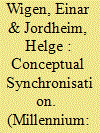

|
|
|
|
|
| Summary/Abstract |
International order is also temporal order, based on the alignment, more precisely, the synchronisation of the multiple times at work on a global scale. Synchronicity between cultures, languages, and polities does not emerge by itself. To create temporal orderings on a global scale requires work: political, social, and linguistic. Some work of synchronisation is performed by technological innovations such as clocks, trains, telegraph lines, phones, satellites etc. Another set of tools, however, is linguistic, made up by concepts used to make historical and political time understandable and workable. Concepts are used to order events, objects and polities temporally, thus making both them and their temporality aspects of international order. By drawing together experiences, events, and meanings from different knowledge fields or cultures, they synchronise them, aligning their speeds, rhythms, and durations. One of the most central concepts that have been used in synchronisation over the past two centuries is progress. In this article we map out how it has synchronised temporalities on a global scale, and ask whether progress is in the process of being replaced by the concept of crisis as the main tool for synchronising temporalities in international society – using examples from political and administrative rhetoric as well as anthropological studies.
|
|
|
|
|
|
|
|
|
|
|
|
|
|
|
|
| 6 |
ID:
188925
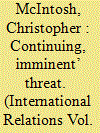

|
|
|
|
|
| Summary/Abstract |
For nearly two decades, the United States has chosen to narrate its response to terrorism through what Judith Butler refers to as the ‘frame of war’. Despite this, victory in that country’s longest war remains largely unimaginable. In some ways this is a problem of time – it is not that victory or an end to the conflict is literally unimaginable, it’s that from our political present, an end appears radically discontinuous. This article builds on recent work using temporality and the political present as a lens and conceptual framework to better understand how temporal assumptions and frames shape the practice of war and political violence. In this article, I show how time and timing play a significant role in justifying the violence of the war on terrorism and in making it intelligible as war. I examine the past three administrations and focus on three areas – the borders of wartime, temporal continuity, and the vision of a post-war future – to show important differences in administrative approaches. To more concretely understand the practice of political violence going forward, attention to the temporal dynamics of politics must be front and center, particularly one possessing ambivalent frames. Doing so reveals the implications these dynamics have for the conduct and permissibility of violence.
|
|
|
|
|
|
|
|
|
|
|
|
|
|
|
|
| 7 |
ID:
167655


|
|
|
|
|
| Summary/Abstract |
Trapped in the premises of the transition ‘paradogma,’ democratization and authoritarian persistence literature are limited by a linear and continuous understanding of time, a gradualist view of transition, and a procedural definition of democracy. These analytical and normative strictures are compounded by a methodological nationalism that prevents an appreciation of how global factors shape the parameters for political transformation in the contemporary Middle East. Inspired by Gramsci’s theory of history, this article seeks to move beyond these limitations and explore the prospect of transition as rupture, away from democratization as strategy for ensuring duration of capitalist time, and toward democratic transition as epochal change beyond capitalism. By counterposing the effects of the two globalizations and the decolonization in between on the prospects of political transformation in the Middle East, this article argues that the Arab uprisings provide an opportunity for thinking globally and rupturally about political time, transition and democracy in the region.
|
|
|
|
|
|
|
|
|
|
|
|
|
|
|
|
| 8 |
ID:
187511
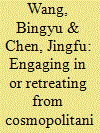

|
|
|
|
|
| Summary/Abstract |
This paper explores the temporal dimensions in and consequences of migration from the perspective of how they are involved in both promoting and undermining cosmopolitan attitudes and practices amongst mobile subjects. Drawing on qualitative research with new Chinese migrants to New Zealand, the paper explores how their process of becoming cosmopolitan to participate in intercultural interactions is constructed differently in relation to momentary, everyday, remembered and imagined times/temporalities embedded in their lives. In particular, the paper asks whether and how migrant individuals navigate through temporal dissonance occurred across the migratory process by engaging in or retreating from cosmopolitanism. Essentially, this paper develops a temporally-sensitive theoretical approach to unpack how time and temporalities function in the migration process, especially how they articulate with the possibilities of migrant individuals encountering diversity and obtaining a sense of home in the host society, thus contributing to studies of cosmopolitanism and time in migration.
|
|
|
|
|
|
|
|
|
|
|
|
|
|
|
|
| 9 |
ID:
188346
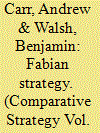

|
|
|
|
|
| Summary/Abstract |
The Fabian strategy is one of the most famous military strategies. Yet beyond notions of withdrawal and trading “space for time”, there is little clarity in the literature about how it operates. In this article, we develop a framework to explain the strategy based wearing down an adversary over time and then seeking a battlefield decision. We also examine contingent factors in shaping success or failure. In the final section, we explore what the Fabian strategy, famous for its use of time, tells us about acting strategically in the temporal domain.
|
|
|
|
|
|
|
|
|
|
|
|
|
|
|
|
| 10 |
ID:
164975
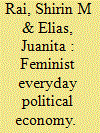

|
|
|
|
|
| Summary/Abstract |
It goes without saying that feminist International Political Economy (IPE) is concerned in one way or another with the everyday – conceptualised as both a site of political struggle and a site within which social relations are (re)produced and governed. Given the longstanding grounding of feminist research in everyday gendered experiences, many would ask: Why do we need an explicit feminist theorisation of the everyday? After all, notions of everyday life and everyday political struggle infuse feminist analysis. This article seeks to interrogate the concept of the everyday – questioning prevalent understandings of the everyday and asking whether there is analytical and conceptual utility to be gained in articulating a specifically feminist understanding of it. We argue that a feminist political economy of the everyday can be developed in ways that push theorisations of social reproduction in new directions. We suggest that one way to do this is through the recognition that social reproduction is the everyday alongside a three-part theorisation of space, time, and violence (STV). It is an approach that we feel can play an important role in keeping IPE honest – that is, one that recognises how important gendered structures of everyday power and agency are to the conduct of everyday life within global capitalism.
|
|
|
|
|
|
|
|
|
|
|
|
|
|
|
|
| 11 |
ID:
188856
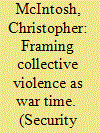

|
|
|
|
|
| Summary/Abstract |
Writing on the US war on terrorism, Judith Butler identified how discursive frames are produced and reproduced in ways that make certain forms of violence discernable as war. These frames that make war an intelligible form of political violence are not only spatial, but irreducibly temporal in nature. Their circulation–e.g., the framing of US counter-terror efforts as ‘war’ – enables some lives to be understood as grievable, while others lack political and normative value. These frames not only determine what is and is not a war, but whose deaths represent an unremarkable facet of peacetime. This article explores one instance where the circulation of these frames had the potential for rupture – the 2016 shooting at the Pulse nightclub in Orlando. First, it use the event’s liminal status as a ‘terrorist attack’ to make visible the frame(s) operating in the contemporary US political present to render certain acts of violence intelligible as political violence, terrorism, or war. Second, it explores the temporal dimension of these frames, showing how they function together within national security narratives to authorize certain forms of violence as exceptional. This article concludes by exploring the potential for ‘timing’ this violence differently as a means of political resistance.
|
|
|
|
|
|
|
|
|
|
|
|
|
|
|
|
| 12 |
ID:
137391
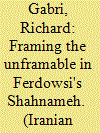

|
|
|
|
|
| Summary/Abstract |
This paper explores the ways in which the Shahnameh thematizes the poet's fraught relationship with language to not only complicate our overall understanding of the epic poem but also our understanding of the language which makes the poem, and the world outside the poem, intelligible. Through a close reading of some of the prologues and epilogues that frame the Shahnameh’s tales, this essay argues that rather than helping us understand how to interpret the epic's morally ambiguous tales, the frames to Ferdowsi's tales, ironically represent a narrator who is in no position to offer us any help. Of course, the poet does give us clues as to why he and consequently we are “helpless” (bichāreh) when it comes to understanding his tales, which, in its own way, can be considered helpful. What seems to hinder understanding at every turn for the poet is, paradoxically, the very language or speech (sakhon/sokhan) that makes understanding possible in the first place.
|
|
|
|
|
|
|
|
|
|
|
|
|
|
|
|
| 13 |
ID:
155719
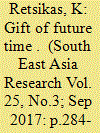

|
|
|
|
|
| Summary/Abstract |
The attainment of religiously informed and socially responsible wealth is a desire widespread in the metropolises of Java, Indonesia, especially amongst the pious middle classes. This article aims at an understanding of the emergence and effects of an early 21st century desire for pious entrepreneurial success, by focusing on the practices people consistently and regularly undertake in order to actualise this. It claims that the religiously informed desire for entrepreneurial success is permeated by a mode of temporality that privileges the future at the expense of the past and the present. This temporal orientation has important consequences for subject-making, as it forces the subjectivities created to take a distinctively asymptotic form, resulting in the production of self-differing subjects; that is, subjects in which past, present and future actualisations lack coincidence and complete convergence.
|
|
|
|
|
|
|
|
|
|
|
|
|
|
|
|
| 14 |
ID:
090729
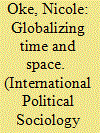

|
|
|
|
|
| Publication |
2009.
|
| Summary/Abstract |
Globalization discourse is concerned with the effects of spatial change-changes in the shape, scale and extensity or social processes-and the effects of temporal change-particularly changes to, or away from, modernity. By drawing together both axes of change, globalization discourse suggests a way of navigating this tension. However, it is argued here that most globalization theories accord primacy to one of these axes, which results in them being conflated. As a result, globalization theories are often presented in highly systemic terms and downplay the diversity of social processes.
|
|
|
|
|
|
|
|
|
|
|
|
|
|
|
|
| 15 |
ID:
118791
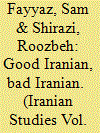

|
|
|
|
|
| Publication |
2013.
|
| Summary/Abstract |
This article analyzes the ways in which Iran and Iranians are represented in Western news media sources. Through detailed textual analysis of articles in Time and Newsweek between 1998 and 2009, it demonstrates that journalistic representations of Iran and Iranians are not simply efforts aimed at describing the real Iran, but rather form the basis of what Said refers to as a powerful "community of interpretation" that often reflects and reproduces certain xenophobic stereotypes of non-Western foreign subjects. While some shifts in Western media representations of Iranians have occurred in the thirty years since the revolution, the underlying ontological assumptions of these representations have remained remarkably durable. That is to say, the dominant representational discourse found in these newsmagazines depicts the political behavior of Iranians on the basis of essentialized notions of Persian and/or Islamic civilization, while very often emphasizing the taken for granted superiority of the West. Earlier Orientalist discourses focus on the difference of non-Western foreign subjects by denigrating them as fundamentally anti-modern and incapable of political, cultural and economic development without Western intervention. This article presents an unmistakable discursive pattern in American journalism whereby certain Iranians
|
|
|
|
|
|
|
|
|
|
|
|
|
|
|
|
| 16 |
ID:
161168
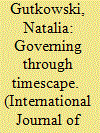

|
|
|
|
|
| Summary/Abstract |
Social scientists commonly know that time is a social construct and a tool for governing by those holding power. Yet, how exactly is time used for governing? This article examines how timescape (embodiment of approaches to time) works in practice as a tool of power by considering multiple networks of time that manifest in al-Batuf/Beit Netofa Valley planning policy. This valley's agriculture, mostly owned by Palestinian-Arab citizens of Israel, is considered by ecologists and officials a unique traditional agriculture landscape and wetland habitat that has become scarce in Israel due to its development and wetland drainage. Assembling separate modes of anthropological inquiry that attend to time as a technique, I show that knowledge, ethics, and time management are not separate spheres of governance but rather interwoven as one timescape tool of governing. Thus, the case of al-Batuf/Beit Netofa elucidates the ways in which time is used for governing in the context of an agricultural-environmental development policy and plan.
|
|
|
|
|
|
|
|
|
|
|
|
|
|
|
|
| 17 |
ID:
138249
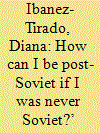

|
|
|
|
|
| Summary/Abstract |
Based on anthropological fieldwork conducted in the Kulob region of southern Tajikistan, this paper examines the extent to which the existing periodization ‘Soviet/post-Soviet’ is still valid to frame scholarly works concerning Central Asia. It does so through an analysis of ‘alternative temporalities’ conveyed by Kulob residents to the author. These alternative temporalities are fashioned in especially clear ways in a relationship to the physical transformations occurring to two types of housing, namely flats in building blocks and detached houses. Without arguing that the categories ‘Soviet’ and ‘post-Soviet’ have become futile, the author advocates that the uncritically use of Soviet/post-Soviet has the unwanted effect of shaping the Central Asian region as a temporalized and specialized ‘other’.
|
|
|
|
|
|
|
|
|
|
|
|
|
|
|
|
| 18 |
ID:
177990
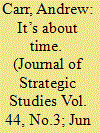

|
|
|
|
|
| Summary/Abstract |
Strategy is action in space and time. It is impossible to conceive of strategic behaviour outside of time, and the management of temporal factors plays a substantial role in determining the path and outcome of conflict. Yet time’s role in strategy has been empirically under-studied and theoretically neglected by scholars. This paper addresses this by identifying four constituent concepts of time for strategists: Order, Duration, Significance and Transition. The paper explores how each applies to and can improve our understanding of strategic behaviour. The paper concludes by outlining some of the promising avenues of policy opportunity and scholarly research.
|
|
|
|
|
|
|
|
|
|
|
|
|
|
|
|
| 19 |
ID:
123128
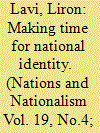

|
|
|
|
|
| Publication |
2013.
|
| Summary/Abstract |
Despite global, economic, technological and social transformations, nationality has remained an influential identity category. It still forms the basis for collective self-determination, political sovereignty and sense of belonging. This article puts forward the concept of 'Chrono-Work' to offer a critical approach to national identity. Employing temporal and performative perspectives, the concept addresses the conditions for establishing and constructing national identity. Drawing on Judith Butler's performance theory, it is suggested that performance of national acts loads national identity with meaning through the construction of a chronological narrative. To complete the theoretical picture, a case study of 'Chrono-Work' among the Jewish settlers on the Golan Heights in Israel is offered. It is shown that national identity is constantly performed through temporal strategies that aim at achieving a chronological order. Therefore, it is suggested that national identity is not given, but rather is the result of continuous 'Chrono-Work'.
|
|
|
|
|
|
|
|
|
|
|
|
|
|
|
|
| 20 |
ID:
165738
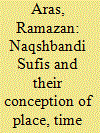

|
|
|
|
|
| Summary/Abstract |
The employment of diverse forms of security and control on territorial borders have led to the production of numerous events of border crossings, smuggling, banditry and death along with stories of separation, loss, mourning, pain, and yearning in the everyday life of border people. The Naqshbandi Khaznavi order has an expansive interpersonal social network across the political borders of Turkish and Syrian nation-states. This work analyzes the ways in which Sufis dealt with diverse aspects of the Turkish-Syrian border by unbinding shackles and orders of political system that were fabricated constantly from the 1920s to the early 1980s. The life stories and narratives of the Sufis document the existence of a religious-cultural landscape, diversifying the perception of place, time and fear which have transcended political borders for decades, contradicting official cartographic imagination and the modern-secular understanding of place and time. Besides, in addition to analyses of religious orders as social, economic and political entities, this work aims to elucidate emotional aspects of relations and faith that coexist between Sufis and their Sheikh in the context of spatial distance, political border and fear of death.
|
|
|
|
|
|
|
|
|
|
|
|
|
|
|
|
|
|
|
|
|